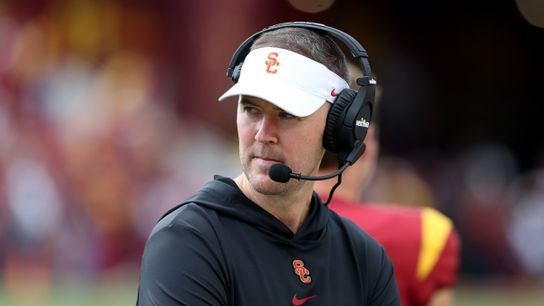It was a story that bounced around the message boards throughout the month of December: a number of Oklahoma players were facing imminent suspensions, only nobody knew how many, or how, or how long, or for what. Lincoln Riley's public comments only fueled the fire, as he seemingly acknowledged there was something there, only he couldn't say what.
Then, on Dec. 18, it was reported that defensive end Ronnie Perkins, running back Rhamondre Stevenson and wide receiver Trejan Bridges would miss the upcoming Peach Bowl semifinal, reportedly for a failed marijuana test. OU finally announced the suspensions on Dec. 23, though Riley still wouldn't confirm the reason why.
Then the game arrived, Oklahoma got drilled, and the rest of the country moved on.
They haven't moved on in Oklahoma, largely because the NCAA won't let them. Perkins, Stevenson and Bridges remain suspended for the first five games of the 2020 season, as outlined by NCAA policy:
The penalty for a positive test for a substance in the cannabinoid class is withholding from competition for 50% of the season in all sports in which the student-athlete participates. A second positive test for a cannabinoid results in the loss of a year of eligibility and withholding from participation for 365 days from the test.
All three players are expected to be key contributors for the Sooners in 2020, or at least were. Perkins finished second on the team in 2019 with 13.5 tackles for loss and six sacks. Stevenson rushed for 515 yards and six touchdowns. Bridges saw action on both sides of the ball as a true freshman and a former high 4-star recruit.
As Oklahoma prepared to open spring practice on Tuesday, Riley met with the media and argued it's time for the NCAA's drug testing policy to move beyond 1962.
“It’s made it kind of the elephant in the room that nobody wants to talk about,” Riley said. “Like we do with every part of our program, we’re trying to evolve. We’re not saying, ‘Well, we’ve just always done it like this, so that’s how we’ll do it.’ We’re trying to improve and make sure we’re doing everything we can for our student-athletes. I don’t know that I have all the answers right now. These are evolving, and it’s something we’ll continue to look at to make sure we’re doing the best that we can.”
Yes, Riley has a personal stake in the issue, but most people aren't attuned to injustice until it affects them.
And it's not overstating things to argue the NCAA's policy of half a season for one failed marijuana test an injustice. Marijuana is decriminalized in 33 states, and fully legal in 10. Medical marijuana is legal in Oklahoma.
The NFL is in the process of decriminalizing marijuana, at least when it comes to playing time. The NBA doesn't suspend players until a third failed test, and that suspension is five games -- six percent of the season. Major League Baseball no longer classifies pot as a "drug of abuse" and sends players who test positive to treatment rather than suspending them -- placing marijuana on the same plane as alcohol.
That, Riley said, is what the NCAA should do with marijuana.
Sports aside, a 2018 Gallup poll found two in three American adults believe the United States should legalize marijuana, an increase from 12 percent in 1970 and 44 percent in 2009. That includes 53 percent of Republicans and 59 percent of those 55 and older.
We're living in a reality where, soon, college football players will be able to transfer and play without penalty and profit on their name, image and likeness. Things are changing quickly here in the year 2020. On Monday, Riley opened a conversation that could see marijuana join those policies the NCAA held for decades only to quickly abandon with the change of public opinion.
